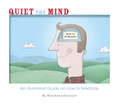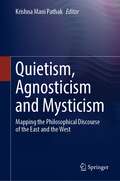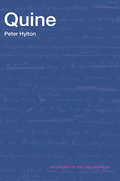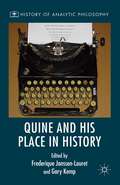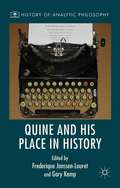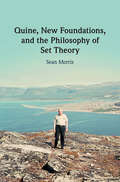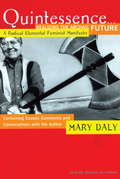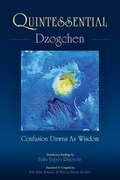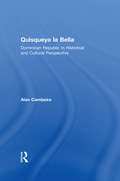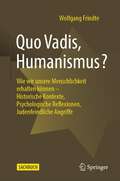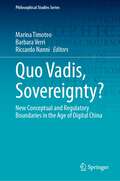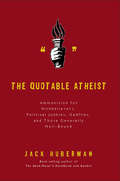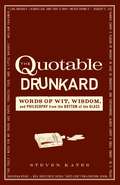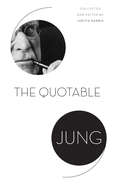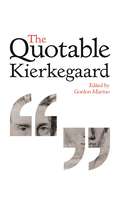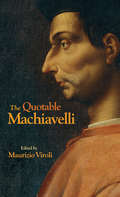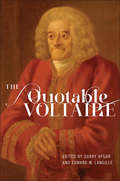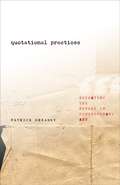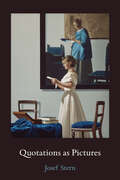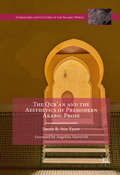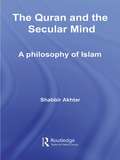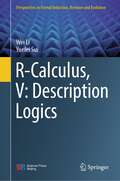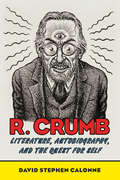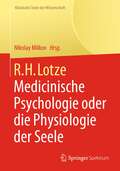- Table View
- List View
Quiet the Mind
by Matthew JohnstoneIn a world where finding even ten minutes to 'do nothing' can be difficult, the benefits of meditation can be profound. Meditation is simply a way of giving our brains a well-deserved break and can actually help our brains to function healthily and happily. This beautifully illustrated guide is an inspiring and practical book which shows you how to meditate without the need for uncomfortable lotus positions or prayer beads! With his typical gentle and insightful humour, Matthew's guide to meditation will enable to you to feel more present, more youthful, have more energy and greater concentration, improve your mood and sleep more soundly.
Quietism, Agnosticism and Mysticism: Mapping the Philosophical Discourse of the East and the West
by Krishna Mani PathakThis book presents a unique collection of papers on various philosophical aspects of the unknown and unvoiced truth and reality of the cosmic world. It offers a systematic analysis of the three philosophical theories of Quietism, Agnosticism and Mysticism and introduces readers to the fundamentals of mystical knowledge claimed by philosophical schools of the east and the west. It discusses, debates and deliberates on philosophical issues concerning the acquisition of truth, its objectivity and its various dimensions along with the application of thoughts pertaining to Quietism, Agnosticism, and metaphysical-mystic traditions in philosophy. It examines and precisely defines the scope and limits of knowledge, the respective way of life, its expressions and morality, mystical revelation, ineffability of the ultimate, value realism, and faith and reason - with a primary focus on the classical Indian schools of Hinduism, Buddhism, Jainism, Agnosticism, the Bāuls, Greek traditions, modern western meta-philosophy, and contemporary quietist debate in religion and theology. This insightful collection should be of great interest to independent researchers, students and teachers of philosophy, theology, Mysticism and Agnosticism, cultural studies and religious studies.
Quine (Arguments of the Philosophers)
by Peter HyltonQuine was one of the foremost philosophers of the Twentieth century. In this outstanding overview of Quine's philosophy, Peter Hylton shows why Quine is so important and how his philosophical naturalism has been so influential within analytic philosophy. Beginning with an overview of Quine's philosophical background in logic and mathematics and the role of Rudolf Carnap's influence on Quine's thought, he goes on to discuss Quine's famous analytic-synthetic distinction and his arguments concerning the nature of the a priori. He also discusses Quine's philosophy of language and epistemology, his celebrated theory of the indeterminacy of translation and his broader views of ontology and modality. This book is essential reading for anyone interested in Quine, twentieth century philosophy and the philosophy of language.
Quine and His Place in History (History of Analytic Philosophy)
by Frederique Janssen-Lauret Gary KempContaining three previously unpublished papers by W.V. Quine as well as historical, exegetical, and critical papers by several leading Quine scholars including Hylton, Ebbs, and Ben-Menahem, this volume aims to remedy the comparative lack of historical investigation of Quine and his philosophical context.
Quine and His Place in History (History of Analytic Philosophy)
by Gary Kemp Frederique Janssen-LauretQuine and His Place in History.
Quine, New Foundations, and the Philosophy of Set Theory
by Sean MorrisQuine's set theory, New Foundations, has often been treated as an anomaly in the history and philosophy of set theory. In this book, Sean Morris shows that it is in fact well-motivated, emerging in a natural way from the early development of set theory. Morris introduces and explores the notion of set theory as explication: the view that there is no single correct axiomatization of set theory, but rather that the various axiomatizations all serve to explicate the notion of set and are judged largely according to pragmatic criteria. Morris also brings out the important interplay between New Foundations, Quine's philosophy of set theory, and his philosophy more generally. We see that his early technical work in logic foreshadows his later famed naturalism, with his philosophy of set theory playing a crucial role in his primary philosophical project of clarifying our conceptual scheme and specifically its logical and mathematical components.
Quintessence: Basic Readings from the Philosophy of W. V. Quine
by Willard Van QuineThrough the first half of the twentieth century, analytic philosophy was dominated by Russell, Wittgenstein, and Carnap. Influenced by Russell and especially by Carnap, another towering figure, Willard Van Orman Quine (1908–2000) emerged as the most important proponent of analytic philosophy during the second half of the century. Yet with twenty-three books and countless articles to his credit—including, most famously, Word and Object and "Two Dogmas of Empiricism"—Quine remained a philosopher's philosopher, largely unknown to the general public. Quintessence for the first time collects Quine's classic essays (such as "Two Dogmas" and "On What There Is") in one volume—and thus offers readers a much-needed introduction to his general philosophy. Divided into six parts, the thirty-five selections take up analyticity and reductionism; the indeterminacy of translation of theoretical sentences and the inscrutability of reference; ontology; naturalized epistemology; philosophy of mind; and extensionalism. Representative of Quine at his best, these readings are fundamental not only to an appreciation of the philosopher and his work, but also to an understanding of the philosophical tradition that he so materially advanced.
Quintessence...Realizing the Archaic Future: A Radical Elemental Feminist Manifesto
by Mary Daly"Suffused with her inimitable word play and stunning intelligence, and embodying a balance of mysticism and critical theory, Daly's clarion call to uncover the quintessence of the universe is quite an intriguing tune." -On the Issues
Quintessential Dzogchen: Confusion Dawns as Wisdom
by Marcia Binder Schmidt Erik Pema Kunsang Tulku UrgyenThis hands-on guidebook adapts the Dzogchen path for the modern student while adhering to traditional principles. The book is based on the direct, accessible style of Tulku Urgyen Rinpoche and offers a thorough grounding in how to study, contemplate, and meditate in this rich spiritual environment. Guided by an introductory teaching by Rinpoche, as well as 42 selected teachings from great Dzogchen masters, readers learn to access the pure, clear awareness that lies hidden under the constant flow of anxious thoughts.From the Trade Paperback edition.
Quisqueya la Bella: Dominican Republic in Historical and Cultural Perspective (Perspectives On Latin America And The Caribbean Ser.)
by Alan CambeiraA history of the Dominican Republic from pre-Columbian times to the present. The book focuses on the merger of three cultures across time - the indiginous cultures of the Caribbean, the Iberians of southern Europe and the Africans.
Quo Vadis, Humanismus?: Wie wir unsere Menschlichkeit erhalten können - Historische Kontexte, Psychologische Reflexionen, Judenfeindliche Angriffe
by Wolfgang FrindteWie steht es mit den humanistischen Grundlagen unseres Lebens und Zusammenlebens? Müssen wir uns nicht gerade heute dieser Fundamente versichern? Wer greift diese Fundamente an? Um diese Fragen beantworten zu können, nutzt der Autor ein Konstruktionsprinzip, mit dem die humanistischen Anstrengungen seit Petrarca in dreifacher Weise gerahmt werden: Zum einen werden diese Anstrengungen in die jeweiligen historischen Kontexte eingeordnet; zum zweiten greift er auf Reflexionen zurück, die sich in den verschiedenen Entwicklungsetappen der Psychologie explizit oder implizit auf den Humanismus beziehen; drittens schließlich macht er auf judenfeindliche und antisemitische Äußerungen, Vorurteile, Diskriminierungen und Vernichtungsexzesse aufmerksam, um die Ambivalenzen der verschiedenen humanistischen Anstrengungen zu verdeutlichen. Denn, so der Autor, die Einstellung und das Verhalten gegenüber Jüdinnen und Juden sind der Lackmustest eines jeglichen Humanismus.
Quo Vadis, Sovereignty?: New Conceptual and Regulatory Boundaries in the Age of Digital China (Philosophical Studies Series #154)
by Marina Timoteo Barbara Verri Riccardo NanniThis book presents an interdisciplinary exploration of digital sovereignty in China, which are addressed mainly from political, legal and historical point of views. The text leverages a large number of native Chinese experts among the authors at a time when literature on China’s involvement in internet governance is more widespread in the so-called “West”. Numerous Chinese-language documents have been analysed in the making of this title and furthermore, literature conceptualising digital sovereignty is still limited to journal articles, making this one of the earliest collective attempts at defining this concept in the form of a book. Such characteristics position this text as an innovative academic resource for students, researchers and practitioners in international relations (IR), law, history, media studies and philosophy.
The Quotable Atheist: Ammunition for Nonbelievers, Political Junkies, Gadflies, and Those Generally Hell-Bound (Philosophy Ser.)
by Jack HubermanSurprisingly, no book of quotations on God and religion by atheists and agnostics exists. Luckily, for the millions of American nonbelievers who have quietly stewed for years as the religious right made gains in politics and culture, the wait is over. Bestselling author Jack Huberman's zeitgeist sense has honed into the backlash building against religious fundamentalism and collected a veritable treasure trove of quotes by philosophers, scientists, poets, writers, artists, entertainers, and political figures. His colorful cast of atheists includes Karen Armstrong, Lance Armstrong, Jules Feiffer, Federico Fellini, H. L. Mencken, Ian McKellen, Isaac Singer, Jonathan Swift, Ludwig Wittgenstein, Virginia Woolf and the Marquis de Sade.
The Quotable Drunkard: Words of Wit, Wisdom, and Philosophy From the Bottom of the Glass
by Steven KatesFrom pubs, alehouses, wine bars, vineyards, across the table, and under the table comes a flowing river of thoughts about drinking. Some of it you'll find profound, some of it funny, some of it silly. But all of it's about that most inspired of human inventions: alcohol.From the ancient ("The man who isn't jolly after drinking is just a driveling idiot to my thinking." --Euripedes) to the modern ("Alcohol--the cause of and the solution to all of life's problems." --Homer Simpson), here is wit, wisdom, and drunken ramblings about beer, wine, whiskey, gin, and every other alcoholic substance humans have happily used since the beginning of time to pickle their livers. Mixed with favorite drink recipes, short biographies of potable quotables, and information about favorite watering spots, this is a resource you will want to keep next to the bottle of Beefeaters and bitters.
The Quotable Jung
by Judith Harris Tony Woolfson C. G. JungC. G. Jung (1875-1961) was a preeminent thinker of the modern era. In seeking to establish an interdisciplinary science of analytical psychology, he studied psychiatry, religion, mysticism, literature, physics, biology, education, and criminology. He introduced the concepts of extraversion and introversion, and terms such as complex, archetype, individuation, and the collective unconscious. He stressed the primacy of finding meaning in our lives.The Quotable Jung is the single most comprehensive collection of Jung quotations ever assembled. It is the essential introduction for anyone new to Jung and the Jungian tradition. It will also inspire those familiar with Jung to view him in an entirely new way. The Quotable Jung presents hundreds of the most representative selections from the vast array of Jung's books, essays, correspondence, lectures, seminars, and interviews, as well as the celebrated Red Book, in which Jung describes his own fearsome confrontation with the unconscious. Organized thematically, this collection covers such topics as the psyche, the symbolic life, dreams, the analytic process, good and evil, creativity, alchemical transformation, death and rebirth, the problem of the opposites, and more. The quotations are arranged so that the reader can follow the thread of Jung's thought on these topics while gaining an invaluable perspective on his writings as a whole.Succinct and accessible, The Quotable Jung also features a preface by Judith Harris and a detailed chronology of Jung's life and work.The single most comprehensive collection of Jung quotations ever assembledFeatures hundreds of quotesCovers such topics as the psyche, dreams, good and evil, death and rebirth, and moreIncludes a detailed chronology of Jung's life and workServes as the ideal introduction to Jung and the Jungian tradition
The Quotable Kierkegaard
by Søren KierkegaardThe most comprehensive and authoritative collection of Kierkegaard quotations ever published"Why I so much prefer autumn to spring is that in the autumn one looks at heaven—in the spring at the earth."—Søren KierkegaardThe father of existentialism, Søren Kierkegaard (1813-1855) was a philosopher who could write like an angel. With only a sentence or two, he could plumb the depths of the human spirit. In this collection of some 800 quotations, the reader will find dazzling bon mots next to words of life-changing power. Drawing from the authoritative Princeton editions of Kierkegaard's writings, this book presents a broad selection of his wit and wisdom, as well as a stimulating introduction to his life and work.Organized by topic, this volume covers notable Kierkegaardian concerns such as anxiety, despair, existence, irony, and the absurd, but also erotic love, the press, busyness, and the comic. Here readers will encounter both well-known quotations ("Life must be understood backward. But then one forgets the other principle, that it must be lived forward") and obscure ones ("Beware false prophets who come to you in wolves' clothing but inwardly are sheep--i.e., the phrasemongers"). Those who spend time in these pages will discover the writer who said, "my grief is my castle," but who also taught that "the best defense against hypocrisy is love."Illuminating and delightful, this engaging book also provides a substantial portrait of one of the most influential of modern thinkers.Gathers some 800 quotationsDrawn from the authoritative Princeton editions of Kierkegaard's writingsIncludes an introduction, a brief account and timeline of Kierkegaard's life, a guide to further reading, and an index
The Quotable Machiavelli
by Niccolò Machiavelli Maurizio ViroliNiccolò Machiavelli (1469–1527) is the father of modern political thought, but he is also one of the greatest writers of the Renaissance and his wisdom and style extend far beyond politics to encompass a compelling philosophy of life as well. In The Quotable Machiavelli, Maurizio Viroli, one of the world’s leading Machiavelli scholars, offers a rich collection of the Florentine’s most memorable words on a wide range of subjects, including politics, the human condition, religion, love and happiness, antiquity and history, patriotism, and virtue. Drawing on Machiavelli’s entire body of writings, and including little-known quotations as well as famous passages, the book shows the full scope of his thought and belies the cliché that he was a “Machiavellian” cynic. In addition to Machiavelli’s own words on dozens of subjects of perennial interest, the book includes some almost unknown texts in which his contemporaries describe him. Complete with a biographical introduction, the book serves as a handy reference and a smart and lively introduction to a masterly thinker and writer.Includes a rich collection of Machiavelli’s most memorable words on a wide range of subjects, from politics to the human condition—almost 700 quotations in allEdited and introduced by one of the world’s leading Machiavelli scholarsServes as a smart and lively introduction to Machiavelli’s life and worksDraws on the complete body of Machiavelli’s writingsFeatures a brief biography of Machiavelli, a chronology of his life, suggestions for further reading, and an index
The Quotable Voltaire
by François-Marie Arouet (1694-1778)The author of more than 2,000 books and pamphlets, Voltaire (François-Marie Arouet, 1694-1778) was one of the most prolific writers of the eighteenth century, and also one of the wittiest and most insightful. This unique collection of over 800 of Voltaire’s wisest passages and choicest bons mots runs the gamut on topics from adultery to Zoroaster, in both English and French. Drawing from a wide range of his publications, private letters, and remarks recorded by his contemporaries, The Quotable Voltaire includes material never before gathered in a single volume. English translations appear alongside the original French, and each quote is thoroughly indexed and referenced, with page numbers for both the first known publication edition of each entry and the most recent edition of Voltaire’s works. The book also features over 400 quotes about Voltaire, including commentary by eighteenth-century luminaries like Samuel Johnson, Catherine the Great, Casanova, and John Adams, as well as an eclectic assortment of modern-day personages ranging from Winston Churchill and Jorge Luis Borges to Mae West and Mike Tyson. Lavishly illustrated with nearly three dozen images of Voltaire-related art, this collection opens with a scholarly essay that recounts the great man’s life and reflects on his outsized influence on Western culture. Whether you are a Voltaire scholar or a neophyte, The Quotable Voltaire is the perfect introduction to a brilliant mind.
Quotational Practices
by Patrick GreaneyLiterature and art have always depended on imitation, and in the past few decades quotation and appropriation have become dominant aesthetic practices. But critical methods have not kept pace with this development. Patrick Greaney reopens the debate about quotation and appropriation, shifting away from naïve claims about the death of the author. In interpretations of art and literature from the 1960s to the present, Quotational Practices shows how artists and writers use quotation not to undermine authorship and originality, but to answer questions at the heart of twentieth-century philosophies of history.Greaney argues that quotation is a technique employed by art and philosophy to build ties to the past and to possible futures. By exploring quotation's links to gender, identity, and history, he offers new approaches to works by some of the most influential modern and contemporary artists, writers, and philosophers, including Walter Benjamin, Guy Debord, Michel Foucault, Marcel Broodthaers, Glenn Ligon, Sharon Hayes, and Vanessa Place.Ultimately, Quotational Practices reveals innovative perspectives on canonical philosophical texts as well as art and literature in a wide range of genres and mediums--from concrete poetry and the artist's book to performance, painting, and video art.
Quotations as Pictures
by Josef SternThe proposal of a semantics for quotations using explanatory notions drawn from philosophical theories of pictures. In Quotations as Pictures, Josef Stern develops a semantics for quotations using explanatory notions drawn from philosophical theories of pictures. He offers the first sustained analysis of the practice of quotation proper, as opposed to mentioning. Unlike other accounts that treat quotation as mentioning, Quotations as Pictures argues that the two practices have independent histories, that they behave differently semantically, that the inverted commas employed in both mentioning and quotation are homonymous, that so-called mixed quotation is nothing but subsentential quotation, and that the major problem of quotation is to explain its dual reference or meaning—its ordinary meaning and its metalinguistic reference to the quoted phrase attributed to the quoted subject. Stern argues that the key to understanding quotation is the idea that quotations are pictures or have a pictorial character. As a phenomenon where linguistic competence meets a nonlinguistic symbolic ability, the pictorial, quotation is a combination of features drawn from the two different symbol systems of language and pictures, which explains the exceptional and sometimes idiosyncratic data about quotation. In light of this analysis of verbal quotation, in the last chapters Stern analyzes scare quotation as a nonliteral expressive use of the inverted commas and explores the possibility of quotation in pictures themselves.
The Qur’an and the Aesthetics of Premodern Arabic Prose
by Sarah R. bin TyeerThis book approaches the Qur'an as a primary source for delineating the definition of ugliness, and by extension beauty, and in turn establishing meaningful tools and terms for literary criticism within the discipline of classical Arabic literature (adab). Focusing on the aesthetic dimension of the Qur'an, this methodology opens up new horizons for reading adab by reading the tradition from within the tradition and thereby examining issues of "decontextualisation" and the "untranslatable. " This approach, in turn, invites Comparatists, as well as Arabists, to consider other means and perspectives for approaching adab besides the Bakhtinian carnival. Applying this critical strategy to literary works as diverse as One Thousand and One Nights and The Epistle of Forgiveness, Sarah R. bin Tyeer aims to prove two major points: how Bakhtin's aesthetics is anachronistic and therefore theoretically inappropriate when applied to certain literary works and how ultimately this literary methodology is sometimes used as a proxy for ungrounded and, sometimes, unfair arguments by other scholars.
The Quran and the Secular Mind: A Philosophy of Islam
by Shabbir AkhtarThis book is concerned with the rationality and plausibility of the Muslim faith and the Qur'an, and in particular how they can be interrogated and understood through Western analytical philosophy. It also explores how Islam can successfully engage with the challenges posed by secular thinking. The Quran and the Secular Mind will be of interest to students and scholars of Islamic philosophy, philosophy of religion, Middle East studies, and political Islam.
R-Calculus, V: Description Logics (Perspectives in Formal Induction, Revision and Evolution)
by Wei Li Yuefei SuiThis book series consists of two parts, decidable description logics and undecidable description logics. It gives the R-calculi for description logics. This book offers a rich blend of theory and practice. It is suitable for students, researchers and practitioners in the field of logic.
R. Crumb: Literature, Autobiography, and the Quest for Self
by David Stephen CalonneRobert Crumb (b. 1943) read widely and deeply a long roster of authors including Robert Louis Stevenson, Charles Dickens, J. D. Salinger, Jack Kerouac, William S. Burroughs, and Allen Ginsberg, as well as religious classics including biblical, Buddhist, Hindu, and Gnostic texts. Crumb’s genius, according to author David Stephen Calonne, lies in his ability to absorb a variety of literary, artistic, and spiritual traditions and incorporate them within an original, American mode of discourse that seeks to reveal his personal search for the meaning of life. R. Crumb: Literature, Autobiography, and the Quest for Self contains six chapters that chart Crumb’s intellectual trajectory and explore the recurring philosophical themes that permeate his depictions of literary and biographical works and the ways he responds to them through innovative, dazzling compositional techniques. Calonne explores the ways Crumb develops concepts of solitude, despair, desire, and conflict as aspects of the quest for self in his engagement with the book of Genesis and works by Franz Kafka, Jean-Paul Sartre, the Beats, Charles Bukowski, and Philip K. Dick, as well as Crumb’s illustrations of biographies of musicians Jelly Roll Morton and Charley Patton. Calonne demonstrates how Crumb’s love for literature led him to attempt an extremely faithful rendering of the texts he admired while at the same time highlighting for his readers the particular hidden philosophical meanings he found most significant in his own autobiographical quest for identity and his authentic self.
R.H. Lotze: Medicinische Psychologie oder die Physiologie der Seele (Klassische Texte der Wissenschaft)
by Nikolay MilkovOriginaltext mit philosophischen sowie historischen Kommentaren von Nikolay Milkov Als habilitierter Mediziner und Philosoph hat Rudolph Hermann Lotze durch seinen interdisziplinären Ansatz die Entwicklung der Psychologie im 19. Jahrhundert wie kein anderer geprägt. Im Unterschied zu anderen Wissenschaftlern der Zeit hat Lotze die neue Disziplin konsequent in enger Verbindung mit der Philosophie betrachtet, wie besonders in Medicinische Psychologie oder Physiologie der Seele (1852) deutlich wird. Dies bedeutete seine bewusste Abkehr von der Herangehensweise, die Psychologie ganz über experimentelle Untersuchungen und damit die Empirie zu definieren. Lotze scheute sich jedoch, diese entstehende Disziplin „philosophische Psychologie“ zu nennen, für ihn war sie nur physiologische Psychologie, herausgearbeitet mit Hilfe der Philosophie: Sie stellt Tatsachen fest und untersucht, wie Körper und Seele sich zueinander verhalten, tut dies jedoch nicht nur empirisch, sondern auch „metaphysisch“. In diesem Band wird Lotzes Originaltext untersucht, kommentiert und eingebettet in den soziokulturellen Hintergrund der Entstehungszeit, um einen tiefen, aber verständlichen Einblick in diesen Bereich der Psychologie zu geben.
